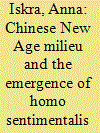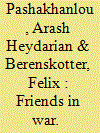| Srl | Item |
| 1 |
ID:
178174


|
|
|
|
|
| Summary/Abstract |
The accelerating speed of economic, social, and cultural reforms in the past three decades in mainland China has created an atmosphere of moral uncertainty that encouraged many people to search for happiness by turning inwards. Shen xin ling (身心灵, translated as Body-Heart-Soul) fever refers to the growing interest among Chinese urbanites in various seminars that creatively transform the guiding principles of the Euro-American New Age movement, incorporating China into transnational networks of alternative spiritualities. This anthropological investigation into the shen xin ling milieu locates its genealogy in the progression of several post-Maoist self-cultivation fevers, most notably the recent ‘psycho-boom’. It focuses on Chinese New Agers’ practices of emotional release, conceptualizing them as ‘psy-venting’ spaces where the emotions that could result in resentment at those who perpetuate structural inequalities are released, dispersed, and channelled back to the individual. In so doing, these affective flows become carriers for Chinese state discourses related to therapeutic governing. This process is characterized by tensions as shen xin ling practitioners find themselves positioned at the intersections of state-endorsed discourses on consumerism, entrepreneurialism, the re-traditionalization of gender roles, and anxieties over multilevel marketing schemes and accusations of ‘evil cult’.
|
|
|
|
|
|
|
|
|
|
|
|
|
|
|
|
| 2 |
ID:
178179


|
|
|
|
|
| Summary/Abstract |
This article scrutinizes the assumption that friends support each other in times of war. Picking up the notion that solidarity, or ‘other-help’, is a key feature of friendship between states, the article explores how states behave when a friend is attacked by an overwhelming enemy. It directs attention to the trade-off between solidarity and self-help that governments face in such a situation and makes the novel argument that the decision about whether and how to support the friend is significantly influenced by assessments of the distribution of material capabilities and the relationship the state has with the aggressor. This proposition is supported empirically in an examination of Sweden’s response to its Nordic friends’ need for help during the Second World War – to Finland during the 1939–1940 ‘Winter War’ with the Soviet Union, and to Norway following the invasion of Germany from 1940 to 1945.
|
|
|
|
|
|
|
|
|
|
|
|
|
|
|
|